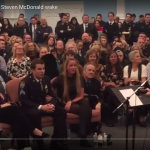The following was written by The Christophers’ Jerry Costello:
It’s that time of year again. Come Oct. 4, or thereabouts, people all over will celebrate the Feast of St. Francis of Assisi by bringing their pets to church for a blessing. This will include not only the “usual” pets–dogs, cats, fish, birds–but some of the more exotic ones as well: hamsters, geckos and the like. (One Franciscan priest even celebrated the feast day by blessing a boa constrictor, and you can’t blame him if he decided to draw the line after that.) In short, the blessing of the animals is here to stay.
What’s wrong with this picture? Why, not a thing. Some priests see it as part of the New Evangelization. Others welcome the influx of people it brings to their churches. And no less a Franciscan than Father Jeremy Harrington, current Guardian of the Franciscan Monastery in Washington, D.C., reminded the Catholic Standard there last year that everyone loves St. Francis. “He saw animals as a beautiful sign of God’s care and friendliness toward us,” he said. “Of course we want to share that with those who bring their animals here.”
It’s just that–well, there’s so much more to Francis. Although advocates tend to view him as a spokesman for contemporary causes–animal rights, perhaps, or ecology, or feminism–the truth is that St. Francis was very much a man of his times. And those times were rugged indeed, without all the trappings of the 21st century.
“The one thing people need to remember [is that] Francis was a devout, committed 13th-century Catholic,” said Dominican Father Augustine Thompson, author of a new biography of the saint (“Francis of Assisi”) that appeared earlier this year. “That helps explain many things about him.”
For example, Father Thompson told Our Sunday Visitor last April, Francis was not at war with the institutional Church. “One of the things Francis taught me is that holiness is impossible without fidelity to Catholic teaching,” he said. His study of St. Francis, he continued, revealed to him that “the love of God is something that remakes the soul,” and that “true Christian freedom comes from obedience, not autonomy.”
As many earlier biographers have done, Father Thompson debunks many of the myths about Francis, the pious legends that have so colored popular impressions of the saint. “Francis is not the birdbath saint,” he said, “not someone who never discovered he was wrong or who never had any doubts.”
And yet, he continued, “The image of him spontaneously desiring to follow God’s will wherever it would lead him; that’s the kind of free spirit part of Francis that is true. If he perceives God is telling him to do something if it’s something he doesn’t expect or it’s weird, he will do it. I think that is beautiful and it’s true.”
Years ago I wrote these words about St. Francis: “Francis did not choose a simple way of life for its own sake. Rather he did so to enable him to be possessed by God completely, without distraction; to choose every action in a way that would bring him closer to the Lord.”
I think those words, written for a Treasury of Catholic Stories published by Our Sunday Visitor, still hold up well as a summary of his remarkable life. So by all means bring the pets to be blessed, and do so in the spirit of Francis. But at the same time try to remember: there’s a lot more than that to all the things that St. Francis of Assisi really was.












